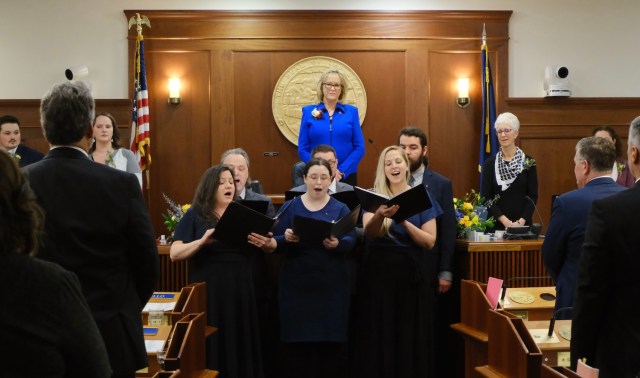![]()
Rep. Nellie Unangik Jimmie, D-Bethel, shakes hands with Lt. Gov. Nancy Dahlstrom (not pictured) after taking her oath of office on Tuesday, Jan. 21, 2025, in Juneau. (Photo by James Brooks/Alaska Beacon)
For the first time in eight years, the Alaska Legislature has opened its two-year session without a deadlock in its lower chamber.
On Tuesday, members of the state House of Representatives picked Rep. Bryce Edgmon, I-Dillingham, as speaker of the House with a 21-19 vote.
Not since 2017 has the House picked a leader on the first day of the legislative session. Edgmon’s selection marked the return to power of a mostly Democratic coalition that controlled the House from 2017 through 2023. A predominantly Republican coalition has controlled the House for the past two years.
State senators reelected Sen. Gary Stevens, R-Kodiak, to lead a mostly Democratic coalition in that half of the Capitol.

Speaking after his election, Edgmon said that even though both legislative coalitions are majority Democratic, “we’re organizing around objectives, goals and common interests that are — what we feel — pretty centrist in terms of being on the political spectrum.”
Stevens and other members of the Senate majority coalition said on Tuesday that they intend to focus on a handful of priority topics, including energy legislation, education funding, elections reform and the revival of a pension program for state employees.
Edgmon said the House coalition is generally aligned with those goals.
Education funding is likely to be the No. 1 priority, with multiple legislators saying that they intend to fast-track a bill that will increase the base student allocation, the core of the state’s per-student funding formula for public schools.
“We’re going to take a hard look at a BSA increase,” Edgmon said when asked whether he expects any major bills to pass in the first half of the Legislature’s 121-day regular session.
“There will be an emphasis on getting that passed, hopefully before the school districts begin to put their budgets together in earnest in March,” he said.

Sen. Lyman Hoffman, D-Bethel and co-chair of the Senate Finance Committee, said he expects that the House will need to take the lead on an education funding bill because compromises may be needed to pass the bill through the House.
The House majority has only 21 members, the bare minimum needed to pass legislation. That means the dissent of a single majority member would be enough to defeat a bill unless it has the support of at least one minority caucus lawmaker.
Last year, BSA-increasing legislation passed the House and Senate but was vetoed by Republican Gov. Mike Dunleavy. Lawmakers failed to override that veto by a single vote, and the failed vote was a major campaign issue in the fall elections.
Speaking to reporters, Hoffman implied that he thinks the legislative math is different this year.
“I think the public has made it quite clear they want a long-term solution to the education equation. And I would say that there’s a much better chance of passing a long-term solution than most people might think,” he said.
Passing legislation that deals with other issues — including the pending Southcentral Alaska energy crunch — could be a trickier proposition, given the one-vote majority in the House, and legislators will still have to contend with Dunleavy, who has never had a veto overridden by lawmakers.
“We’re very cognizant that the House chamber, at least in terms of numbers, between the majority and the minority caucus, it’s very closely divided — 21-19, as you saw on the vote for the speaker,” Edgmon said. “And so we have our work cut out for us, but I’m very confident, having been around the Legislature for a number of years … that we will find common ground.”
On the first day, at least, members of the House did find that common ground.
In 2019, the House endured a monthlong leadership deadlock, with neither Republicans nor a multipartisan coalition able to muster the 21 votes needed to control the House. In 2021, the deadlock lasted for three weeks. Two years ago, the deadlock ended on the session’s second day.
Rep. Cathy Tilton, R-Wasilla, served as speaker of the House for the past two years and said on Tuesday that the key difference this year is that “the Democrats walked in with the 21 and they claimed the majority and had the numbers to prove that claim.”
Minority Republicans also made things easier on Tuesday by declining to nominate a competing candidate for speaker, which sped the largely ceremonial day.
Tilton said that was based on an acknowledgment that they didn’t have the votes, and that the vote against Edgmon would be a sufficient message about their different views.
Ten of the House’s 40 legislators are new this year, and 23 of 40 have been in the House for two years or less, Edgmon said.
“I’m confident that the state is in good hands,” said Lt. Gov. Nancy Dahlstrom after performing the ceremonial swearing-in of new House lawmakers.
“This is the first time in Alaska history that we have had more women than men in this body. There’s 21 women and 19 men, so there’s history being made already on Day 1 here,” she said.
Edgmon added shortly afterward that it’s the first time the House has had three Alaska Native women: Reps. Robyn Niayuq Burke, D-Utqiagvik; Maxine Dibert, D-Fairbanks; and Nellie Unangik Jimmie, D-Bethel.
In the Senate, Stevens concluded his remarks by asking fellow lawmakers “to remember the words of that famous philosopher, John Lennon, when he said, ‘Everything will be OK in the end, and if it’s not OK, it’s not the end.’ So here we are at the beginning. Nothing has gone wrong so far, and we know that can change in the next 120 days, but let’s keep our focus on the end, so that when we get there, all will be OK.”
YOU MAKE OUR WORK POSSIBLE.
